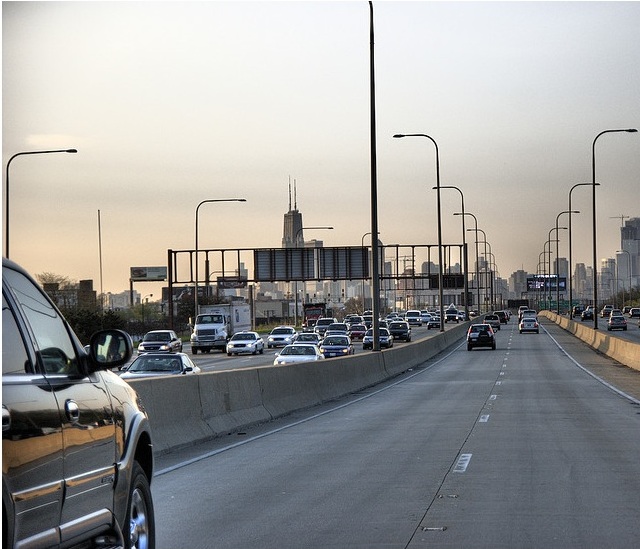Would You Pay To Use Express Lanes During Rush Hour?
By Chris Bentley in News on Oct 16, 2012 5:45PM
Even if you’re not familiar with bumper-to-bumper traffic on Chicago’s highways first-hand, you may have come to know the plight of our auto-borne commuters through the empathetic groans of public radio traffic reporters. “A parking lot,” “a crawl,” and “just brutal,” are some of their painful descriptors for rush-hour flow on the roads.
But a study released Monday by the Chicago Metropolitan Agency for Planning says the city can reduce morning commute times by 31 to 66 percent if it charges drivers to use express toll lanes planned for five new construction projects. The charge would be five to 31 cents per mile depending on the road. That comes out to $2.76 on the Stevenson (I-55) and $3.41 on the Eisenhower (I-290). CMAP’s study says spillover effects of the program would reduce traffic on nearby arterial routes by 6 to 10 percent.
CMAP launched a website and technical report that sing the praises of congestion pricing, a transportation policy long thought to be untenable in a political climate quick to deride any fee or tax as an undue invasion of personal liberty. They hope to convince the Tollway authority, IDOT and other agencies to embrace the idea, which CMAP said would generate an estimated $74 million annually in gross revenue.
The study looked at the Stevenson (I-55); Eisenhower (I-290); the Jane Addams Memorial Tollway (I-90); the planned Elgin-O'Hare West Bypass; the planned Illinois Highway 53 north extension in central Lake County; and the planned Illinois Highway 120 bypass.
This is not a new idea. Mayor Rahm Emanuel previously proposed a downtown parking surcharge to help fund transit initiatives like a new Cermak / McCormick Place El stop and bus rapid transit routes along Jeffery, Western and Ashland avenues. President George W. Bush even proposed a "congestion initiative" in 2007, but tax-weary critics derided that grant program as a bribe. London has charged motorists to drive downtown during certain hours since 2003.
Highways in Orange County, San Francisco, San Diego, Denver, Miami, Minneapolis and elsewhere use congestion pricing. Average fees in dollars per mile are less in CMAP’s proposal than on many of those and on par with others. Salt Lake City’s I-15, however, costs less. Give it some thought when you’re staring a hole through the line of bumpers ahead of you on I-90 this afternoon.
